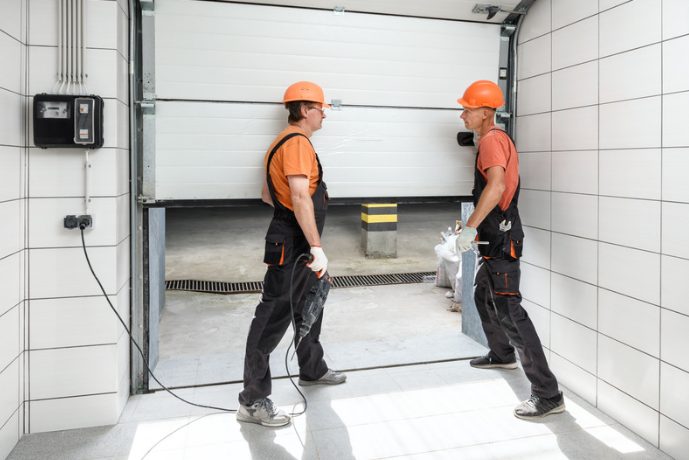A garage door that won’t shut can be both a security risk and a source of frustration. Whether it’s due to sensor issues, track obstructions, or mechanical failures, understanding the root causes and solutions can save you time and money. Here’s an in-depth look at why your garage door might not close and how to address these issues.
Common Reasons Your Garage Door Won’t Shut
Sensor Issues
- Dirty or Misaligned Sensors: The safety sensors near the floor might be dirty or misaligned, causing them to send a false signal to the opener. Cleaning the lenses and ensuring the sensors are aligned can often solve this problem.
- Sensor Wiring Problems: Loose or pinched wiring can disrupt the sensors’ operation. Check for any signs of damage or disconnection.
Track and Roller Problems
- Obstructed Tracks: Debris or minor bends in the tracks can prevent the door from closing. Inspect the tracks for any obstructions and clean or straighten them as needed.
- Worn-Out Rollers: Damaged rollers can hinder the door’s movement. Replacing old or damaged rollers can restore smooth operation.
Mechanical Failures
- Broken Springs: Torsion or extension springs that are worn out or broken can prevent the door from closing. It’s best to seek professional help for spring issues due to the high tension involved.
- Damaged Door Sections: Bent or damaged sections of the door can cause it to buckle during closing. Repairing or replacing these sections can resolve the issue.
Power and Control Issues
- No Power to the Opener: Ensure that the garage door opener is plugged in and receiving power. Check the fuse or circuit breaker if necessary.
- Remote Control or Keypad Malfunctions: Replace the batteries in the remote or reprogram it if it’s not working. Verify that the wall-mounted keypad is functioning properly.
Environmental Factors
- Cold Weather: Cold temperatures can cause motor oil to thicken and metal parts to contract, affecting the door’s operation. Lubricate the moving parts with a silicone-based lubricant to ensure smooth movement.
- Intense Sunlight: Sunlight can interfere with the sensors, making it seem like there’s an obstruction. Installing sun shields or repositioning the sensors can help.
Common Issues and Fixes
| Issue | Possible Cause | Solution |
|---|---|---|
| Sensor Issues | Dirty or misaligned sensors | Clean lenses, realign sensors |
| Track Obstructions | Debris or minor bends in tracks | Clear debris, straighten tracks |
| Worn-Out Rollers | Damaged or misaligned rollers | Replace rollers |
| Broken Springs | Worn out or broken torsion/extension springs | Seek professional help for replacement |
| No Power to Opener | Unplugged opener, blown fuse, or tripped breaker | Plug in, check fuse/breaker |
| Remote Control Issues | Dead batteries, need reprogramming | Replace batteries, reprogram remote |
| Cold Weather Effects | Thickened motor oil, contracted metal parts | Lubricate moving parts |
| Sunlight Interference | Direct sunlight on sensors | Install sun shields, reposition sensors |
| Damaged Door Sections | Bent or cracked sections | Repair or replace door sections |
| Manual Lock Engaged | Manually locked door | Disengage manual lock |
Frequently Asked Questions
How Do I Realign My Garage Door Sensors?
Realigning Sensors: Ensure the sensors are aligned by loosening one of them, adjusting until the indicator light stays steady, then tightening it back in place. Clean the lenses to remove any dirt or debris.
What Should I Do If My Garage Door Springs Are Broken?
Broken Springs: Inspect the springs for any signs of wear or damage. If the springs are broken, it’s crucial to call a professional due to the high tension involved, which can be dangerous to handle without proper tools and expertise.
How Can Cold Weather Affect My Garage Door’s Operation?
Cold Weather Effects: Cold temperatures can cause the metal parts to contract and motor oil to thicken, affecting the door’s operation. Lubricate all moving parts with a silicone-based lubricant to ensure smooth movement.
Why Won’t My Garage Door Close Even Though the Sensors Are Clean?
Interference Issues: If the sensors are clean and properly aligned, check for any potential interference from intense sunlight or radio frequency signals. Installing sun shields for the sensors or addressing any potential signal interference can help.
Preventative Maintenance Tips
- Regular Inspections: Conduct monthly visual and auditory inspections of your garage door to catch any signs of wear and tear early.
- Lubrication: Regularly lubricate all moving parts, especially in extreme weather conditions, to ensure smooth operation.
- Professional Check-Ups: Schedule annual check-ups with a professional to inspect and maintain the springs, opener, and other critical components.
For detailed guides on specific issues like garage door opener battery replacement or how to get a bird out of your garage, visit our website.
Conclusion
A garage door that won’t shut can be more than just an inconvenience. By understanding the common causes and knowing how to troubleshoot and fix them, you can ensure your garage door operates smoothly and securely. However, some issues require professional expertise. If you encounter complex problems or feel unsure about any repairs, don’t hesitate to contact us at MS Garage Door Service for professional assistance. Our team is ready to help you keep your garage door in top condition.



